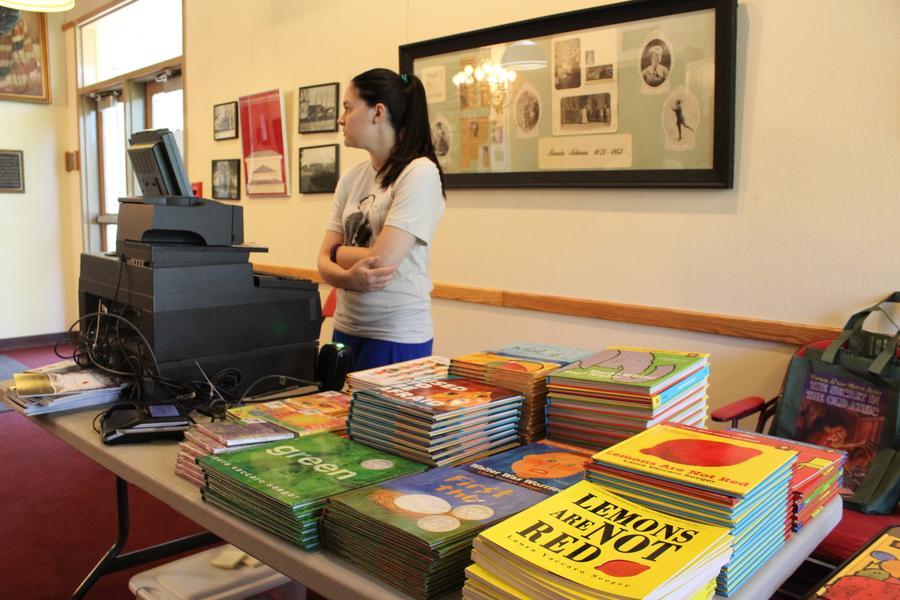The quintessential book festival-goer drinks lattes on a hot day and carries a notepad and pen with them wherever they go. Their conversations quickly rise to a vocabulary level that shows off their love of language, and neither party minds. They fuss over a packed program, unable to decide which panels and discussions they most want to attend. One moment, they’re sighing with a friend about the writing process and editing woes, and the next they’re fluttering around with a break of inspiration after hearing an author speak.
As I observed the crowds at Columbia’s first Unbound Book Festival on Saturday afternoon, I felt a great level of connection among all the readers. The atmosphere was both relaxed and thoughtful. Talking to volunteers and authors about what they’d gleaned from the festival reminded me the powerful presence literature has in many lives.
The festival featured a wide variety of genres including kids’ lit, poetry, fiction, non-fiction and panels. Authors and audiences discussed politics, food, identity and writing processes. Hopping from one auditorium to another on the Stephens College campus took dedication and careful planning. I made it to six events, filled a good portion of my notepad and still wanted more.
If you missed the magic and want to know more about what Unbound covered in its panels and discussions, MOVE has some highlights for you:
**Claire McCaskill, memoir:**
Sen. Claire McCaskill, D-Mo., author of _Pretty Ladylike_, spoke about her experience as a woman in office and how that shaped the message of her memoir. She said a typical politician’s book is about their family life, how much they love America, their education, how much they love America, maybe some hardship anecdotes – and by the way, they love America. McCaskill didn’t want her memoir to be a box to check on the list of tasks to complete in her political career. She wanted young women to read her book and know they could be bossy and have a big mouth, that they could own their ambition and not worry about threatening men. She hoped to be honest, candid and real while still not harming anyone.
**Shann Ray, fiction:**
Ray, author of _American Copper_, professed he was almost too in love with language. He chuckled, remembering his editor scolding him several times for not communicating clearly. Even so, Ray said he loves the editing process. He enjoys focusing on the rhythm of his writing and communicating a feeling to his readers. Questions posed by readers in the audience brought forth discussions about altruism, family dynamics and healing. Ray’s background in psychology and forgiveness studies is evident in the way he speaks about his supportive family and the relational themes he weaves into his novels. In regards to systemic and generational healing, he said that “When you change yourself, others around you have to change.”
**Mary Jo Bang, poetry:**
A line in one of Bang’s poems she read aloud went as follows: “The chaos inspires me, I say, ‘I’m part of this.’” The poet said many times her inspiration process involves looking at surrealist paintings and constructing a story from what she sees. On one occasion she visited an art exhibit featuring sculptures made from dollar-store items and wrote from that experience. Bang reminded writers a poem’s direction can take turns on its own, and whether it shows a basic pessimism or basic optimism is not always up to them.
**Writing Identity, panel:**
Shann Ray and poets Camille Rankine and Patrick Rosal discussed how their identities influence their work and their hopes for better human understanding in general. The moderator asked what the relationship between geography and identity is in the world of writing. Ray, a Montana native, said landscape plays a large role in his writing and views landscape as “a living body.” The panel addressed the catch-22 of “handles,” for example Rosal’s being known as a Filipino poet. He said they can both be an undesired, limiting force but also a point of connection between writers and readers with similar backgrounds. Rankine dislikes being often described as one thing: a black poet. She said she is not trying to transcend who she is, but desires people to resist the instinct to read her work through one lens. Almost all the seats in the room for this event were filled. Audience members answered the panel’s reflections with their similar views on the complexities of identities.
**Bobby Norfolk, kids’ lit:**
Norfolk, who is known for his stage presence and storytelling ability, delivered on his promise to take the audience on a ride in the theater of their minds. He personified a donkey, cow and rooster among other characters while performing a tale about old farm animals forming a band. From the laps of their parents, kids giggled and shrieked, resounding in response to Norfolk’s expressions and voices. Norfolk has created more than ten CDs, co-authored eight children’s books and won three Emmy awards for his storytelling.
**Candice Millard, historical nonfiction:**
Millard, an author of several presidential biographies, explained to readers in her audience the intense depth of research she undertakes when she begins a project. One expedition took her to the Amazon Rainforest in Brazil where she walked the dark lands that pushed Theodore Roosevelt nearly to suicide. While at the Library of Congress for her book about President James A. Garfield, she stumbled upon an envelope filled with hair clipped from his head on his deathbed. Millard said she tries not to get attached to a subject before finding a ton of primary resources including letters, newspaper coverage and journals that would help her make their historical narratives come alive. Once she finishes a book, however, she misses their constant presence in her life.
_Edited by Katherine Rosso | [email protected]_








